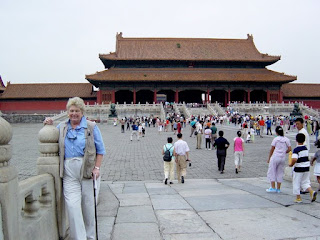It is easier to climb to heaven than travel the Sichuan Road. Li Bai, 7th century
China is a stretch if you have any trouble walking or climbing stairs but it's worth the effort, especially for Westerners who will find themselves flabbergasted by its size, culture and potential.
My foray into its vastness began in Beijing, shifted to Chongqing, jumping off port for a cruise on the Yangtze that ended in Shanghai.
In the posts to come I'll share info and tips on all stops but for now, let's start with some generalities.
Flying time from New York is 13 hours or so. If you're tall, move heaven and earth to get a bulkhead aisle seat or splurge on business class. You'll need it. In either case, get up and move around and do seated exercises to keep your circulation up.
Airports in Beijing and Shanghai are crowded but have wonderful fruit.
Tip: There's an extra step we aren't accustomed to. After checking in with your carrier and getting a boarding pass, look for a line of cashier-like windows with mobs of people milling about. Pick a window, get out your yuan and shove your way through; politeness does not count. Pay the cashier - it was 50 yuan (about $6) in Beijing, 90 yuan ($10) in Shanghai when I was there - and hang on to the piece of paper handed to you; it shows you have paid your airport tax. You won't get past security without it.
When to go. I went in August, which was fine except that rains tended to flood low-lying areas. Beijing weather is similar to that in Philadelphia, Shanghai's is like northeast Florida.
Tip: If this is your first trip to China, do not go during any time span that includes May 1, Oct. 1 or Chinese New Year's Day. Transportation, hotels and restaurants will be crammed with Chinese travelers using holidays to extend vacations (just like we do). Thus, everything will be understaffed.
Numbers. We all know about the crowds, but to the Chinese, numbers have special meanings. 1 connotes want, 2 = song, 3 = grand song, 4 is unlucky, 5 = Myself, I, 6 = luck, 7 = eating, 8 = money, rich (a favorite), 9 = forever and 0 = nothing. They are combined for specific messages. For example, 5168 means I want luck and money.
What to bring. VERY comfortable, sturdy shoes. If you think Europe and the Americas are unevenly paved, consider how long the Chinese civilization has been piling up rocks and stones and nature via earthquakes and erosion has been tearing them down. The Chinese must have the world's strongest ankles. If yours are weak, toss in an Ace bandage or two.
Walking sticks or collapsible cane.
Casual clothes, with one nicer ensemble for dinner in Shanghai. If you are sticking to cities and a Yangtze cruise, laundry services are available so keep that suitcase empty enough to hold lots of souvenirs. You won't and shouldn't resist them, especially the silks and amazingly fast and cheap tailoring.
Tip: Speaking of that, Beijing is known for its cloisonne, Suzhou for its wonderful silk - I love my silk comforter and duvet cover! - and Shanghai has wonderful tailors. The best jade is old, translucent, dense and cuts glass; test before you buy. The best silk feels cool to the touch and slightly sticky. Often what is touted as 14K gold is actually gold plated. Real gold will have a government stamp and the color goes all the way through. Starting to scratch or bite a piece of jewelry is often enough to make the merchant more truthful. Do haggle. I never found anywhere, from street vendor to the cavernous Friendship stores where a better price wasn't available.
The people. They love to pose for photographs and have a great sense of humor. Get them laughing and you've made a friend.
No, the Chinese aren't always angry; they just like to talk loud.
They can be blunt, too, asking visitors everything from "How much?" to "How old?" Answering gives you the right to ask questions of them.
Doorways. The sills are high to prevent good spirits from leaving a room and bad spirits from entering. Bugs and crawly things are deterred, too, as are flood waters. The highest door sills you'll encounter are at temples because as one guide said, demons have been told that if they catch a monk and eat him, they will become immortal.
Double doors at hotels usually are offset instead of aligned - better feng shui.
Monday, January 11, 2010
Subscribe to:
Post Comments (Atom)








0 comments:
Post a Comment